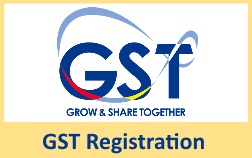Throughout: The Ultimate Roadmap to GST Enrollment for Organizations Looking For Financial Security
Browsing the complexities of Item and Services Tax (GST) enrollment is a critical step for businesses striving for monetary security. Breaking down the roadmap right into workable steps can enhance the enrollment journey for businesses looking to improve their economic standing.
Comprehending GST Fundamentals
Diving right into the basic concepts of Item and Provider Tax Obligation (GST) is crucial for acquiring a detailed understanding of its ramifications on businesses and the economic climate. Input Tax Credit Score (ITC) is a substantial function of GST, permitting businesses to assert credit scores for tax obligations paid on inputs, reducing the total tax obligation burden. Understanding the fundamentals of GST is essential for services to abide with tax guidelines, handle their financial resources efficiently, and add to the nation's economic growth by participating in a transparent tax obligation system.
Eligibility Criteria for Registration
As of the current laws, the threshold limit for GST registration is an annual aggregate turnover of 40 lakhs for services running within a state, except for unique category states where the limitation is 20 lakhs. Furthermore, specific businesses are called for to sign up for GST regardless of their turn over, such as interstate vendors, laid-back taxable individuals, and services responsible to pay tax under the reverse charge system. It is important for companies to extensively evaluate their turn over and deal types to identify their GST registration responsibilities properly.
Papers Required for Registration
Having actually met the qualification standards for GST registration, services must now ensure they have the requisite records in position to continue with the enrollment process efficiently. The papers needed for GST enrollment normally consist of evidence of service constitution, such as collaboration act, registration certification, or consolidation certificate for different kinds of businesses. Furthermore, services need to give records developing the major place of company, such as a rental agreement or electricity costs. PAN card of business, as well as the identity and address proof of promoters/partners/directors, are crucial for confirmation purposes. Financial institution account declarations, along with terminated cheques or a duplicate of the bank passbook, are called for to confirm the financial information supplied throughout enrollment. Moreover, organizations need to have digital signatures all set for the accredited signature. Ensuring all these files are arranged and readily available will certainly quicken the GST enrollment procedure, allowing businesses to abide by tax regulations effortlessly.
Step-by-Step Registration Process
Beginning the GST registration procedure entails a series of structured steps to guarantee a seamless and compliant enrollment for businesses. The primary step is to check out the GST portal and fill up out the registration kind with exact information of the business entity. Following this, the candidate obtains a Short-term Recommendation Number (TRN) which is made use of to return to the application process if it's not completed in one this contact form go.
Next, all required records as per the list offered by the GST portal demand to be posted. These documents typically consist of evidence of service identity, registration and address evidence of marketers, economic statements, and organization entity's frying pan card.

Post-Registration Conformity Guidelines

Final Thought
Finally, businesses seeking monetary stability should understand the fundamentals of GST, fulfill qualification requirements, collect required records, follow the detailed registration procedure, and abide by post-registration guidelines - Best GST registration services in Singapore. By sticking to these steps, businesses can my site guarantee conformity with tax guidelines and keep economic security in the future
Furthermore, particular companies are required to sign up for GST regardless of their turn over, such as interstate providers, laid-back taxable individuals, and services responsible to pay tax under the reverse cost system.Having actually satisfied the qualification requirements for GST registration, useful content businesses have to now guarantee they have the requisite papers in area to proceed with the enrollment process effectively. The files needed for GST enrollment typically include evidence of business constitution, such as collaboration action, registration certification, or consolidation certificate for various kinds of organizations. Additionally, businesses need to provide records developing the principal place of business, such as a rental arrangement or electricity expense.Beginning the GST registration process includes a collection of organized actions to guarantee a certified and smooth enrollment for businesses.